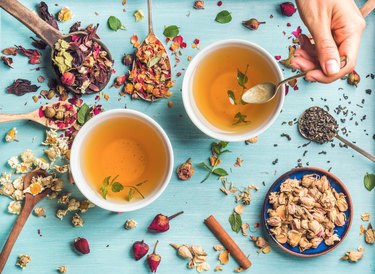
If you want to try a lactation tea, keep in mind that herbs, even those considered safe, can cause unexpected side effects for some people. Since herbs are excreted into breast milk, it's possible a breastfed baby could experience harm as well. Check with your doctor before taking Mother's Milk tea.
Tip
The safety of using the herbs in Mother’s Milk tea while lactating remains unproven. Talk to your doctor.
Video of the Day
Mother’s Milk Tea
Mother's Milk is an herbal tea sold by Traditional Medicinals. It contains fennel, anise, coriander, fenugreek, blessed thistle, spearmint, lemongrass, lemon verbena and marshmallow root. The main ingredients are the fennel and the anise. The tea tastes sweet, with something of a licorice flavor.
Video of the Day
The December 2018 revision of the Drugs and Lactation Database states that fennel contains compounds that act similarly to the hormone estrogen. It's included in products to increase the milk supply in breastfeeding mothers.
A July 2012 study published in ISRN Pharmaceutics says that anise has been used in traditional Iranian medicine to increase mother's milk. Research on fennel and anise is very limited, so efficacy for this use is unproven.
The review of fennel in the Drugs and Lactation Database reports that excessive maternal use of fennel and anise has caused toxicity in at least two breastfed newborn babies. Elevated liver enzymes occurred in one woman taking Mother's Milk tea, as well.
Fennel can also cause allergic responses affecting the skin and respiratory tract. Due to cross-sensitivity, fennel should be avoided if a mother or her baby is allergic to carrots or celery.
Fenugreek Efficacy and Safety
Fenugreek, another herb in Mother's Milk tea, is used to boost milk production during breastfeeding, notes the National Center for Complementary and Integrative Health. While some studies suggest that the herb can help, this use model hasn't been proven.
Because fenugreek has contains estrogen-like compounds, it may be unsafe for women with estrogen-dependent cancers, such as breast cancer. Side effects from using this herb include diarrhea, a worsening of asthma, and an unexpected maple scent in breast milk, urine and perspiration.
Fenugreek shouldn't be used in place of conventional medical treatment of any health condition. This is especially important for anyone with diabetes.
When breastfeeding women take products containing fenugreek, they should be aware that many herbs are excreted into breast milk, say the authors of an April 2018 study published in Evidence-Based Complementary and Alternative Medicine. This effect means that breastfed infants are vulnerable to any side effects that may occur.
The researchers from the Evidence-Based Complementary and Alternative Medicine study concluded that fenugreek may produce both benefits and harm for breastfeeding women. Fenugreek breastfeeding's side effects for baby aren't known, so further research is needed on its safety.
How to Increase Breast Milk
Although it's important to stay hydrated when breastfeeding, no research shows that green tea is beneficial for increasing breast milk. Drink water, milk and juice, but limit coffee, sodas and other caffeinated beverages, advises the Mayo Clinic. If you have an alcoholic drink, avoid breastfeeding for two hours afterward.
Taking good care of your health will help maintain your milk supply. This includes eating a nutritious diet rich in whole grains, fruits and vegetables, and getting regular exercise. Sleep whenever the baby sleeps. Refrain from smoking because it can stunt your milk production and interfere with the baby's rest.
The more you breastfeed, the greater your supply of milk will be when you pump. In addition, the more your pump, the more milk you'll make, says the Mayo Clinic.
Breastfeed on demand when you're with your baby. Avoid formula feedings because they'll lower the baby's demand for breast milk, which will decrease milk production. To keep your supply of milk coming, pump whenever the baby has a formula feeding. Stress can hinder the release of milk, so find a quiet place to pump.
- Mayo Clinic: "Breast-Feeding and Pumping: 7 Tips for Success"
- Drugs and Lactation: "Fennel"
- ISRN Pharmaceutics: "Review of Pharmacological Properties and Chemical Constituents of Pimpinella Anisum"
- National Center for Complementary and Integrative Health: "Fenugreek"
- Evidence-Based Complementary and Alternative Medicine: "Which Benefits and Harms of Using Fenugreek as a Galactogogue Need to Be Discussed During Clinical Consultations? a Delphi Study Among Breastfeeding Women, Gynecologists, Pediatricians, Family Physicians, Lactation Consultants, and Pharmacists"